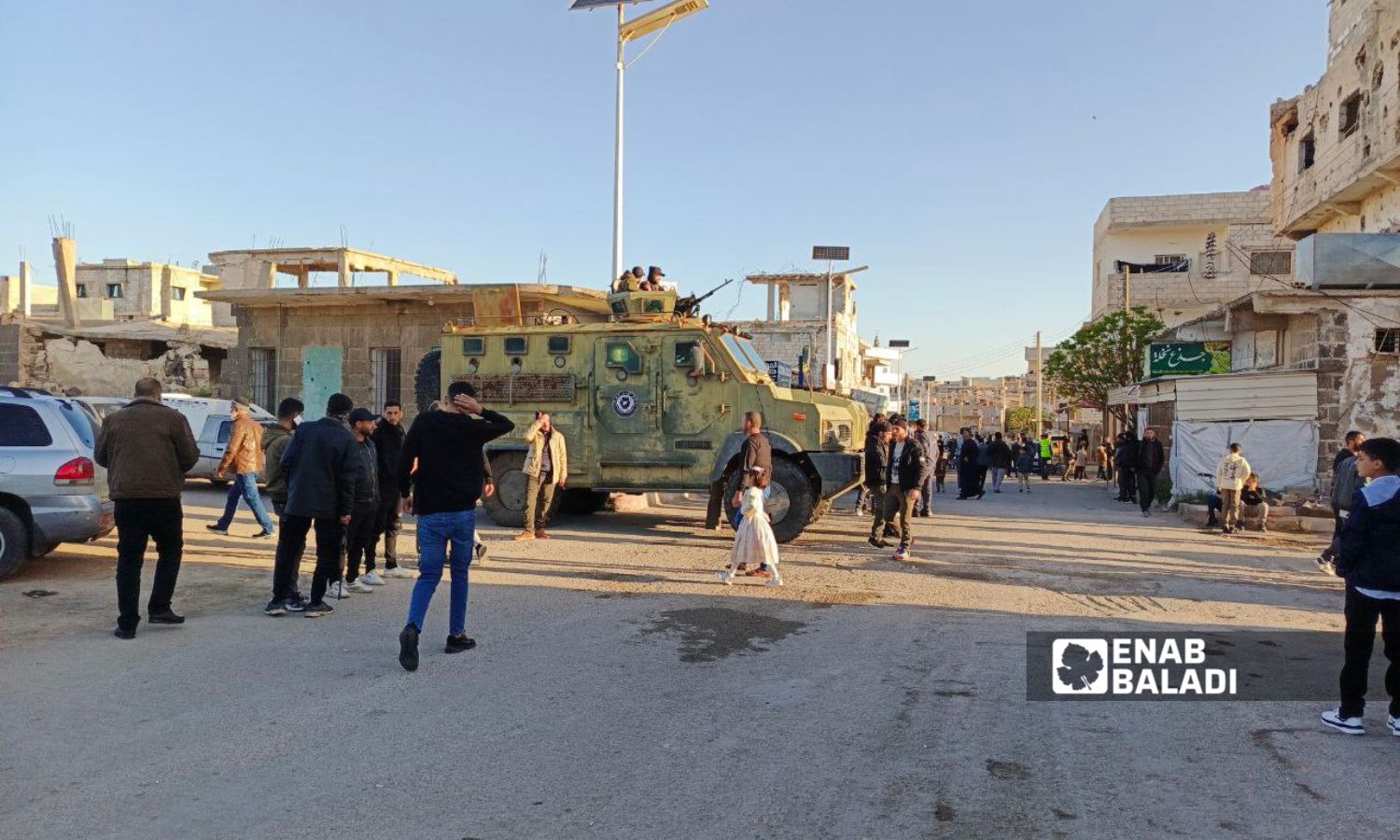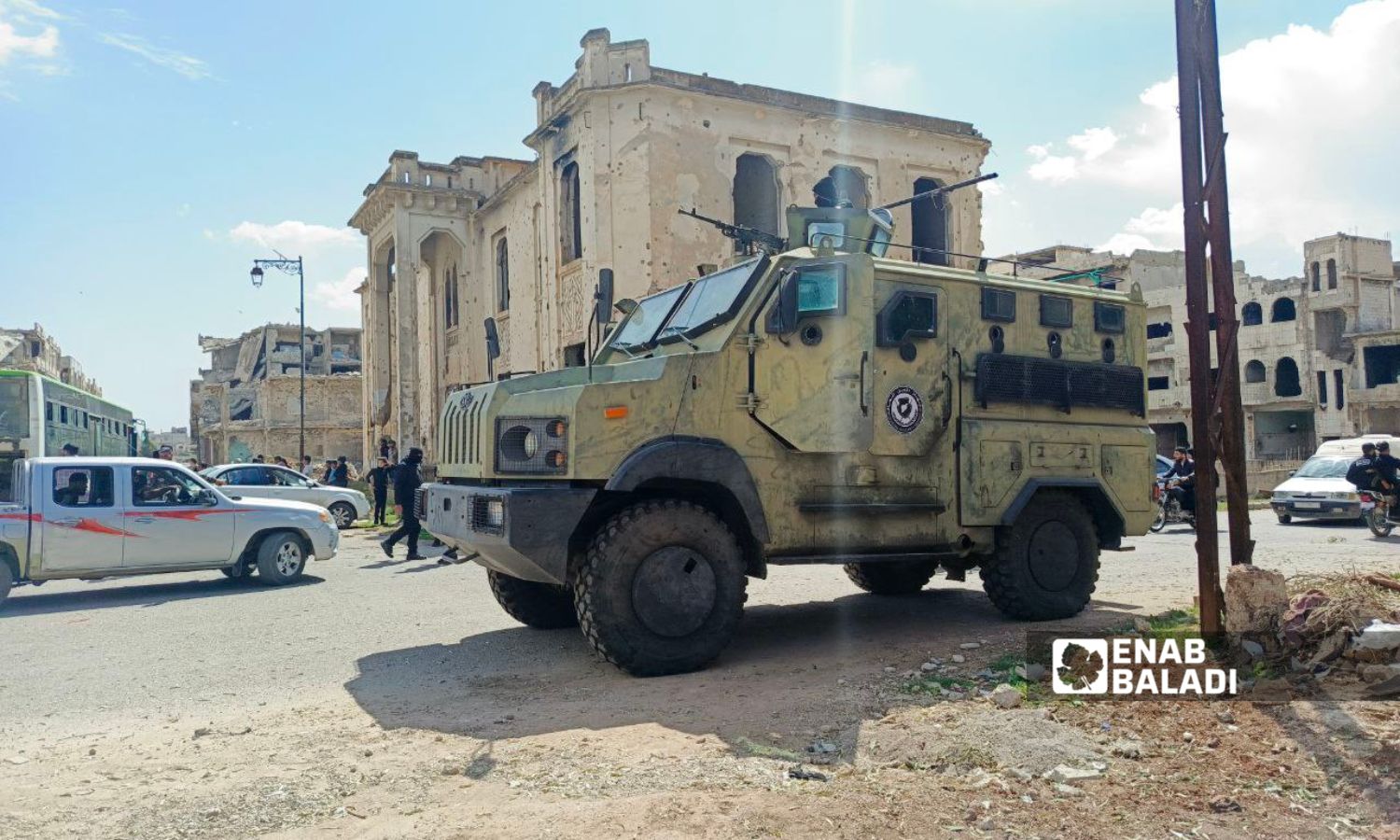



Khaled al-Jeratli | Mahjoub al-Hashish
Despite the passage of nearly four months since the fall of the Syrian regime and the dissolution of all local factions in Daraa province in southern Syria, assassination and targeting operations have resurfaced in the governorate. The latest incident was the assassination of the former leader of the Central Committee, Mohammed al-Khatib, nicknamed “Mohammed al-Mukhtar,” in the town of al-Yadudah in the western Daraa countryside.
The return of daily assassination and targeting operations in Daraa reminded residents of the state of security tension that had overshadowed the governorate for years, raising fears of a return to chaos and security breaches.
These events come following the assumption of General Security Forces affiliated with the Ministry of Interior of the Syrian government of security control, without any significant change in the security reality at the level of the province.
Omar al-Hariri, a member of the Martyrs Documentation Office in Daraa, documented the killing of seven people since the beginning of April due to sporadic targeting operations.
After the fall of the Assad regime in Syria, the frequency of assassination and targeting operations in the province decreased, but they quickly resurfaced again.
The organizational reality in the years following the regime’s control over Daraa province in 2018 led to a clash between the military factions in the area, as the Central Committee was formed in the western countryside and in Daraa al-Balad, comprising several intellectuals, leaders, and notables, with the mission of negotiating with the Russians and the Syrian regime over the terms of the “security settlement.”
Most of its members were subjected to assassination operations after being accused by other local factions of being linked to officials of the ousted regime, especially the head of the Military Security branch, Major General Louay al-Ali, who fled when the province was liberated in mid-December 2024.
Human rights advocate Omar al-Hariri, a native of Daraa, said to Enab Baladi that assassinations are a condition that has been solidified by security chaos, and the spread of weapons under the previous regime, as they were deliberate to spread chaos in the governorate’s arena.
He added that the regime worked to avoid proposing any real solution to this problem, which contributed to the widespread crime “significantly.”
Al-Hariri pointed out that the current authorities are still unable to control matters on one hand, and on the other hand, it seems they do not want to, as happened in al-Sanamayn, which served as a gateway to confiscate the widespread weapons in the area.
The city of al-Sanamayn witnessed confrontations between local factions last January, prompting the General Security Forces to intervene, impose a truce, and begin confiscating weapons from the factions.
In March, the General Security stormed the city of al-Sanamayn and dismantled a military group led by Mohsen al-Haymad, who is accused of carrying out assassination operations in the city and was previously affiliated with the Military Security branch, but managed to escape.

General Security Forces in the streets of Daraa al-Balad – March 31, 2025 (Enab Baladi/Mahjoub al-Hashish)
One of the most prominent figures killed in March was the defector diplomat from the regime, Nour al-Din al-Labbad, and his brother Imad al-Labbad, in the city of al-Sanamayn.
Al-Labbad and his brother were killed by unknown gunmen who infiltrated their home and opened fire on them before fleeing.
Journalist Mohammed Awid, a native of Daraa province, told Enab Baladi that assassinations have not disappeared from the province since the outbreak of the revolution through the settlement agreement and even after the fall of the regime.
He attributed the reasons for the spread of weapons among the residents to the lack of control and the issue of Israeli threats to the region, which require the presence of weapons in the hands of the residents to defend themselves, thus leading to the dilemma of the necessity of confiscating weapons or keeping them in the hands of residents, resulting in potential chaos.
Human rights advocate Assem al-Zoubi, residing in Daraa, noted that assassination operations decreased in the province and nearly vanished after the regime, which “managed assassination operations through its security branches,” fell.
Al-Zoubi told Enab Baladi that the recent assassination operations have not been proven to be organized, and it is expected that there are two reasons for their return: the first is the accumulation of personal grudges and previous disagreements, and the second is related to remnants of the ousted regime.
On his part, journalist Mohammed Awid downplayed the significance of the resurgence in targeting operations, considering that Daraa is a social fabric that largely rejects the presence of the previous regime, and thus there is no opportunity for “regime remnants” to undermine security in the area.
Social expert Ahmad al-Awadat views what is happening in Daraa as a “natural continuation of the cycle of revenge and counter-revenge, and settling scores between parties that have been in conflict for years, which intensified after 2018 due to ideological differences.”
In an interview with Enab Baladi, he noted that the differing perspectives on managing the phase and the relationship with the regime’s security apparatus imposed by the policy of facts on the ground have caused these disputes.
He pointed out that what is being plotted for Syria in general and the south in particular, involving external interests, such as those of Iran and Israel, and perhaps some Arab countries, combined with the interests of internal parties from “regime remnants,” aims to destabilize security and stability, tear apart the social contract, stir up tribal and regional conflicts, and weaken the emerging state.
Al-Awadat considered that the state of security chaos that may be behind it some parties might aim to “instill distrust in the Syrian authorities and their ability to achieve the security that citizens long for.”
On his part, Mohammed al-Ammar, a doctor and activist from the province, stated that the reasons for assassination incidents are primarily related to personal disputes and revenge due to stances that have arisen during the years of war in Syria.
The newly formed General Security filled the security vacuum in the province after the fall of the Assad regime and opened the door for local residents to register in the ranks of the General Security; however, the security apparatus is still unable to control the security situation, especially in light of the continued presence of weapons in the hands of the residents and the lack of actual dissolution of factions.
Activist Omar al-Hariri believes that the General Security is still unable to maintain security in southern Syria, noting that the area requires a large number of trained personnel due to the vast geographic area and the widespread presence of weapons among residents, along with the historical conflicts related to previous assassinations.
According to al-Hariri, solutions lie in security control, confiscating weapons, and imposing strict penalties on violators.
Journalist Mohammed Awid believes that the community should play a role in limiting this phenomenon through mosque preachers, for example, in addition to advocating for the prohibition of killing operations. Notables can also play a pivotal role by seeking to resolve previous disputes and enforcing reconciliation among community members.
Activist Mohammed al-Ammar believes that the current security apparatus “has proven efficient in some security situations,” but the current authority must open up to the revolution’s bases by handing over the security of each town to its youth by structuring them within the General Security apparatus.
The current reality extends beyond the General Security to something broader, related to internal politics, according to expert Ahmad al-Awadat, emphasizing the need to open the door for litigation in state courts to address all crimes that have occurred and other cases, so that every rightful person can obtain their rights under the umbrella of the law and the authority of the state, without allowing space for personal retribution.
Al-Awadat considered that the General Security is merely an executive arm, performing its assigned role and nothing more. He believes that the General Security has not practiced its expected role due to reasons that may be attributed to the lack of personnel, and the opening of admissions to its ranks without verifying some applicants’ records or their criminal past.
He pointed out that failing to control the admission process to security, and allowing individuals with criminal suspicions to enter, may create two contending parties among those who exchange accusations of assassinations, some of whom may abuse their granted authority to settle scores with their rivals, according to al-Awadat.
if you think the article contain wrong information or you have additional details Send Correction